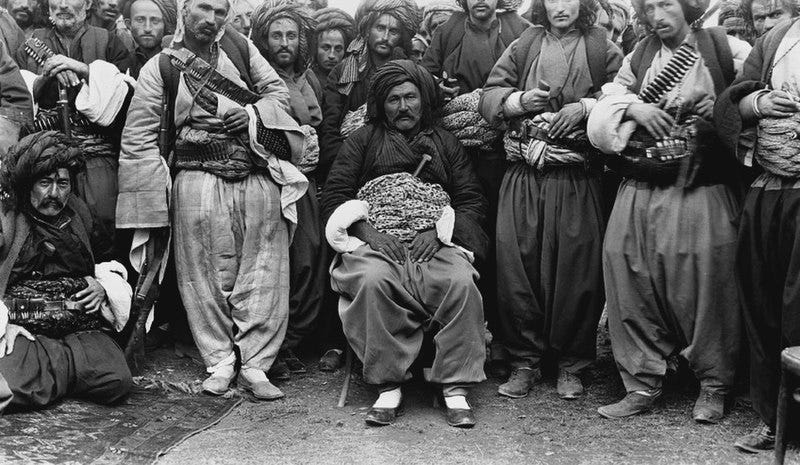
At the class’s request, our students spent the week poring over Aliza Marcus’s very detailed historical and ethnological account of the rise of the PKK, Blood and Belief: The PKK and the Kurdish Fight for Independence.
Just kidding.
(I knew you wouldn’t read it before Sunday, guys. What were you thinking? I admire the gumption, but I bet you haven’t even cracked it open yet, no less read it. No one gets anything done over Christmas. However, I do expect you to read it before next Sunday, now that your relatives have gone home. I meant to send out the reading list and study questions on Monday, too—but no one gets anything done over Christmas. So we’re even. Just try to get through as much of this as you can before Sunday.)
Reading
★ = Required
Books
★ Blood and Belief: The PKK and the Kurdish Fight for Independence, by Aliza Marcus. This remains the canonical study of the PKK. Much of it is available online here. I’ve not yet found a complete PDF, but if I do, I’ll put it in our Google Drive. Here are a few reviews of the book you can read before class if you haven’t read it yet:
The Kurds, edited by Alexander Schahbasi and Thomas Schrot. There’s no need to read this cover to cover, but use it as a reference guide if you have questions about any of the topics covered in the volume—Kurdish identity in the Ottoman Empire; Kurdish languages; Kurdish religions and religiosity; Kurdish political parties in Turkey, Syria, Iraq, and Iran; and so forth. It’s not really at the cutting edge of modern scholarship, but it’s online and it’s free. I think it will probably answer any questions you’re likely to have as you do the reading.
The following books are very helpful, but not required:
A Modern History of the Kurds, by David McDowall. If you’d like to read a comprehensive cultural and political history of the Kurdish people, this is the book.
The Kurds: A Concise Handbook, by Mehrdad Izady. An overview of Kurdish history, culture, and identity from the inhabitants of the Shanidar Caves, near Arbil, 50,000 years ago to 1992, when this book was published.
Agha, Shaikh, and State: The Social and Political Structures of Kurdistan, by Martin Van Bruinessen. This is out of date, but it’s the seminal anthropological and historical analysis of Kurdish society.
The Kurds and the State: Evolving National Identity in Iraq, Turkey, and Iran, by Denise Natali. There’s a good discussion of the book’s strengths and weaknesses in the reviews on Amazon.
The Kurdish Question Revisited, edited by Gareth Stansfield, Mohammed Shareef.
Here’s a review on H-net that’s worth your time.
Here’s a review in The Journal of Kurdish Studies that also functions as an excellent guide to the literature.
I haven’t read it yet, but from this review, Understanding Insurgency. Popular Support for The PKK in Turkey, by Francis O’Connor, sounds very good.
Articles and Monographs
Please read as many of these as you can; if you don’t have time to read them in full, skim them. Try to get enough of a sense of the argument that you could fake it if I call on you.
★ Assessment of the Turkish-Kurdish Conflict, 1984-1999, by J. Connor Williams. If you haven’t had time to look at Marcus’s book, this will give you a chronology of the events she discusses. You can finish it in 20 minutes. (Time it and tell me in class if I’m right.) If you haven’t read Marcus yet, read this before class, if you have, skip it and move on to the rest of the list.
★ Authoritarianism and Escalation: Preparing for the worst in Turkey’s resurgent Kurdish conflict, from the Bipartisan Policy Center. (The members of the task force are our policy heavyweights when it comes to Turkey.) This was written in 2016, but remains very relevant.
Keep reading with a 7-day free trial
Subscribe to The Cosmopolitan Globalist to keep reading this post and get 7 days of free access to the full post archives.




